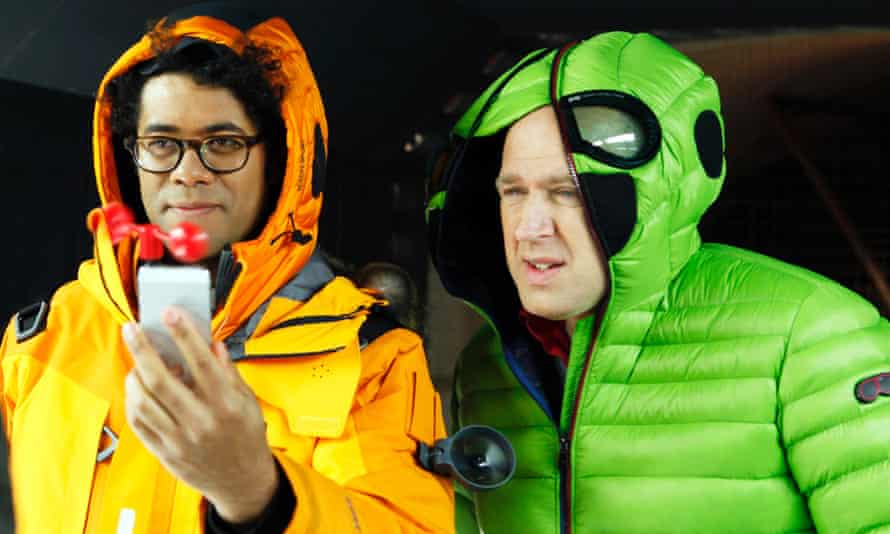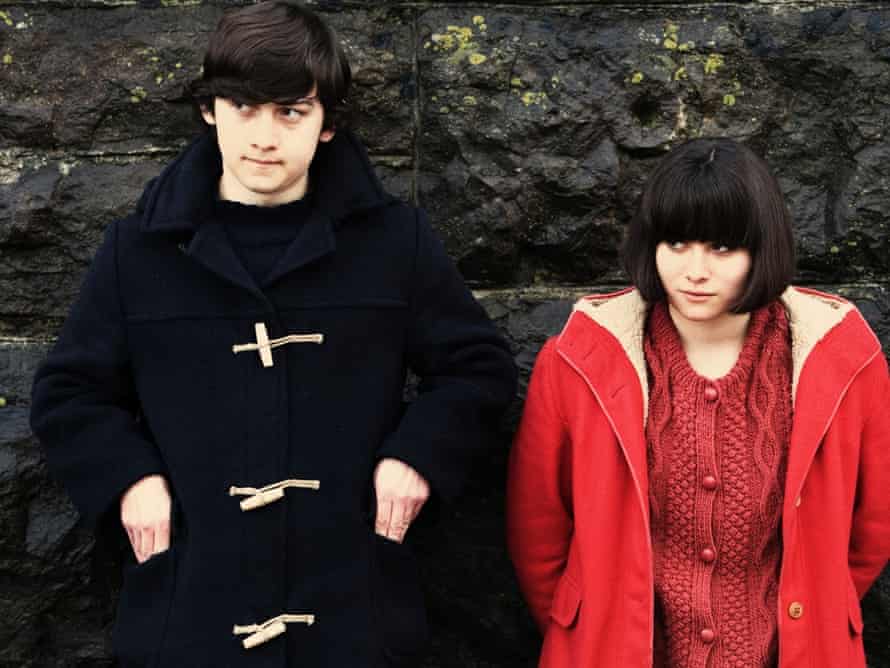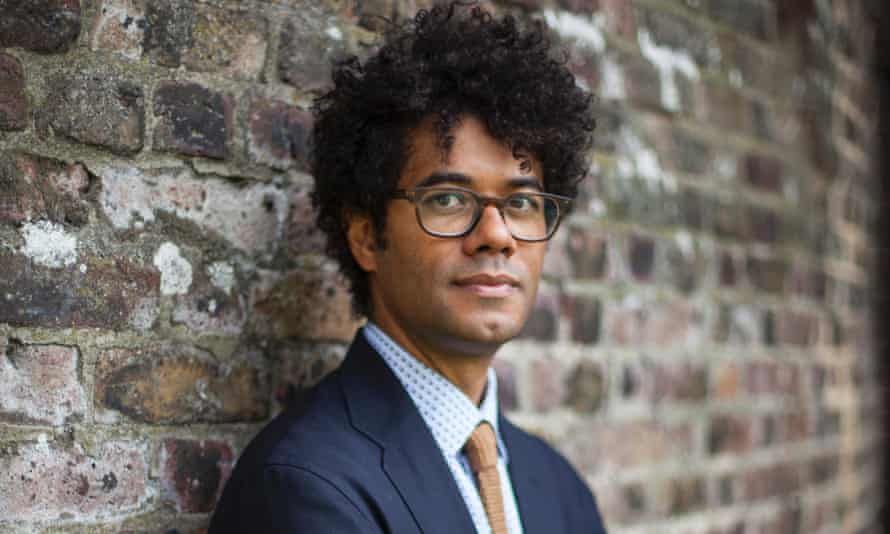Why Is Richard Ayoade So Funny
R ichard Ayoade has asked to be interviewed in the Imperial War Museum. To find him in the museum's cafe, I have to walk through the main entrance, where I'm forced to stare down the barrels of two 50ft naval guns. When I finally reach him, sitting round the back in the museum's grounds, I ask whether this is some kind of interview power play.
"I'm actually doing a Charlton Heston, announcing my support of the NRA," he deadpans. "No, to be honest it just feels not terribly media-y here, and it's quite close to my house."
I'm only a tad suspicious because these are unusual circumstances in which to conduct an interview. There should be plenty to talk about: Ayoade's comedy career, including his Bafta-winning sitcom role as Moss, the socially-inept star of Graham Linehan's The IT Crowd, as well as his two acclaimed films as a director, Submarine and The Double, which, alongside the recent output of Ben Wheatley and Edgar Wright, have made him a leading light of the new school of cultish British filmmaking. But Ayoade's latest work – a book, Ayoade on Ayoade – is an interview itself, in which two fictional versions of the man antagonise one another.
That might sound like a mildly amusing conceit for a traditional autobiography, but Ayoade's actual life is almost entirely absent, his work barely mentioned. The book is more of a surreal and hilarious exercise in self-aggravation. For example, one exchange runs like this: "I read somewhere that you regard your Jewish identity as being important to you." "It's very important. It's foundational." "And yet you're not Jewish." "No." "And you don't find that problematic?" "Not at all. I don't think whether I'm Jewish or not is really relevant to my Jewish identity." "Would you call yourself a practising Jew?" "I use to play guitar but I don't really have time for it any more."
As well as the wonderfully bizarre, there's also some very astute satirisation of the nature of interviews and the culture of personality itself. In one exchange, drenched in typical sarcasm, Ayoade asks himself, "What's next for you?", to which he replies, "Eventually I'd like to see the interviews replace the directing ... the prospect of needing to make a whole film before a stranger tapes my thoughtless utterances and uses them as the basis for a speculative, semi-hostile character portrait makes me very sad."
If that's his fear about our meeting, he doesn't show it initially. In fact he's quite forthcoming as we talk about cinema and comedy. He tells me lots about film I didn't know: the ways in which Woody Allen makes nods to Ingmar Bergman; that the 1960 film Zazie Dans le Metro is useless for teaching yourself French, as Ayoade attempted as a teenager, because the titular character speaks in slang and purposeful mispronunciation.
Pretty quickly though, it's obvious that though I am asking the questions, he is directing the conversation. When I try to ask him about himself, he's more evasive. He has a series of techniques for turning the conversation to other things. One is self-deprecation. When I ask him why he didn't write a more traditional book about his life he replies, "I don't think I could have done. No one had asked me to write the book. I don't think there's any demand for my life story, or a supply. As an economic model, both sides are absent." I point out that hasn't stopped a host of people with far less to say.
When that doesn't work, he tries to turn a specific question about his life into a general one about film, peppering it with relatively obscure references to pre-1960s cinema, of which his knowledge is spectacular, to keep things on his terms.
What he's trying to avoid, he admits, is "the Faustian pact with the media to cannibalise my personality". He's not difficult in the same way as a surly bloke in a rock band who's rude for the sake of it. Mostly, he says, he just finds the interview process hilarious, "because the elephant in the room of any interview is 'consume this product'. That's a very funny subtext to anything. You might as well just go, 'by the way, it's out Monday'."
He tells me about an improv game where the actor is auditioning for a soap commercial but knows the director is also casting for Hamlet, so the player has to drop hints about his capacity for Shakespearean gravitas while in the shower. "So, I guess the underlying current of interviews is, 'Think I'm a nice person, here's my product. Allow me to be self-aggrandising in a self-deprecating way'." He says he finds that duplicity so funny that it was easy to deconstruct in the book.

But I'm not interested in Ayoade's life for half-hearted context or as a way to help him sell his work: I think there's genuine intrigue. He was brought up in Ipswich, by a Nigerian father and Norwegian mother. He went to Cambridge where he studied law and joined the revered student comedy society Footlights. Being one of its few non-white stars and experiencing comedy success at such a young age all seems fruitful personal history from which to draw on in his work. But he remains distrustful of such biographical inquiries.
"There are plenty of examples of people where you're able to enjoy the literature before interviews. Unless people go: 'Oh God, Chaucer, he needed to be humanised. If only I knew what made him tick, I could engage with him.'"
One record that does exist of his beginnings in comedy comes from a documentary the local ITV station made about Footlights at the time. You can see Ayoade alongside a young John Oliver, both in fetching 1990s sweaters, walking along a windswept beach, apparently improvising. "It was literally one of the things that made me not want to do interviews again. You have to imagine: a bunch of 21-year-olds, never-been-out-of-the-house type people. Our tour manager is another 21-year-old saying, 'This is very important publicity, Anglia television want to do a feature.' It was awful. They'd ask us to do a sketch while walking and if we complained they'd say, 'Trust us, we're professionals, we won't make you look ridiculous'. Also, we were in this stage when we were just trying to be Chris Morris. Everyone spoke in that I'M TALKING LIKE THIS voice, all the way through. And it's documented in this awful video, it's really humiliating."
This local TV puff piece triggered a permanent unease with appearing in front of camera outside of a clearly demarcated performance. He did the interviews for his first TV shows in character, and says he constructed a sort of public personality for himself from then on. In person, with no camera on, you don't get any of that slightly dumbfounded geekery you see when he's on panel shows. He speaks as if he were on Radio 4.

Why is it so difficult for him to be himself? "As soon as cameras are there it's just different. It's not being yourself. Your mother could have died that morning but they will say, 'Just be yourself, we have to film'. Anything that's not complete submission to the gaze looks kind of aggressive on camera. Reality stars are geniuses in that they have an ability to be completely undefensive. Joey Essex, for example, is completely open, so you like him. The villains are the defensive ones; shyness can be interpreted as a kind of aggression: 'Who are you to care so much how you come off?'"
Three years after graduating, Ayoade won the Perrier award at the Edinburgh fringe for co-writing and performing in Garth Marenghi's Netherhead, a show that became a cult Channel 4 comedy. He worked alongside the likes of Noel Fielding, Matt Berry and Rich Fulcher on shows such as The Mighty Boosh and Nathan Barley. He also took more traditional entertainment roles, appearing on panel shows and hosting Channel 4's technology show Gadget Man, in which again, although presenting "as himself", he plays a character – a sort of overly-serious and over-enthused news reporter. Think Stephen Sackur doing a One Show segment.
But when Ayoade made the move into directing, something more than the humour and the front shone through. Both 2010's Submarine, an atmospheric and honest secondary school romance in a small Welsh town, and this year's The Double, in which Jesse Eisenberg plays both a nervous and ignored office worker and his confident, sexually successful doppelganger, are sensitive adaptations – the former from Joe Dunthorne's novel, the latter the Dostoevsky classic. Ayoade proved able to present young romance in a way that feels neither cliched nor overblown, and when things fall apart in his films it's genuinely heartbreaking. I think few of his comedy contemporaries could have handled these stories so tenderly. Surely that ability to engage with the human condition comes from personal experience?
Not really. "To me, there's not necessarily a distinct separation between something being funny and something being sad. It can be funny tripping over at a funeral at the worst moment, or getting annoyed if you can't find a parking space. Catcher in the Rye is the funniest book and the saddest book. You can juxtapose things, there are a thousand juxtapositions an A-level student could come up with."
But not any A-level student could direct a film with that level of emotional maturity. Does he not draw on anything to tell those stories? "Yes, but with a lot of things you're not as outside of it as it might come across. You just go, I think this is funny or interesting or seems appropriate. Especially in a film, with the number of people doing it with you, the cameraman, and in this case the co-writer, the actors who might say, I can't play this or this doesn't feel right." Quickly, it's back to Bergman. "It's like saying why is a close-up in a Bergman film seemingly better than a close-up in other films? Everyone has access to those lenses and you could hire those actors, what is it? It's just something about him, at that time, with those people."
Evade, self-deprecate, move it along. It kind of works, but I wonder if there is some onus on Ayoade to engage more with the world he works in. For example, does he not feel as one of the few black people on television, he might want to join recent calls for more diversity in television?
"The thing is, what's my mandate? I feel you need to earn the right to weigh in on complex issues, and that right is probably not granted to you by being moderately efficient at imparting words so that they're amusing. On some level, I can't get away from the undertone that exists, which is, 'Out on Monday'. The danger is, you trivialise what you're saying, because there's a commercial element attached, you might have something to gain."
But everyone, even experts in their field, has something to gain from expressing an opinion. That doesn't mean everyone just keeps silent. "What's difficult is that you could probably have a frank conversation with someone you know well about sensitive issues, but it's almost irresponsible to talk about those issues if you don't know the format or how it might come across."Isn't that being neurotic? Surely there are some issues, particularly within the entertainment industry, that he would be uniquely placed to comment on. He doesn't budge. "If we were just talking among ourselves, it'd be much easier, but there's a recording device, which turns it into a statement, something you have to have thought about, something you maybe even need to defend. This is the only difference between me and Joey Essex. His remit is transparency. The contract is: 'Let's watch you'. With performers or writers, the contract is, 'Show us the thing you've thought about'. It can't be, 'You've really thought about this song Jack White, let's hear it but also, what do you think about Chad?' He's not the guy to talk about Chad."

We continue in this combative vein for a while. At one point he says, "It's hard to read [Nigerian playwright] Wole Soyinka without any knowledge of Yoruba culture, but it shouldn't be something you can't enjoy without a reading list," and then trails off, realising he might have pushed the deflection too far. "That doesn't feel like it's going to be the pull quote, does it?"
The thing is, when I do turn the recorder off, we have a more relaxed conversation – we talk a bit about grim bits of London and the tin-pot dictators who can be involved in student organisations. His unwillingness to ramble isn't a personality trait but a meticulousness, making sure that if he's saying something, it's the right thing, which is why he'll steer conversation back to the area in which he's sure and comfortable.
I'd come to unpick Ayoade's hysterical but slightly farcical book in which he interviews himself. Instead I added one more layer to the self-conscious mess. An interview about interviews to promote an interview where the interviewer is the interviewee, who hates interviews. Or perhaps it's just another speculative, semi-hostile character portrait.
Ayoade on Ayoade is published by Faber & Faber at £14.99. To order a copy for £11.24 with free UK p&p go to bookshop.theguardian.com
Guardian Film Club: Richard Ayoade will be introducing Francois Truffaut's film Day for Night on 9 November. Book now
Source: https://www.theguardian.com/culture/2014/oct/05/richard-ayoade-it-crowd-gadget-man-double-submarine-author